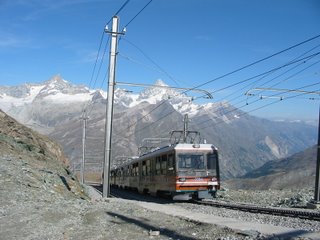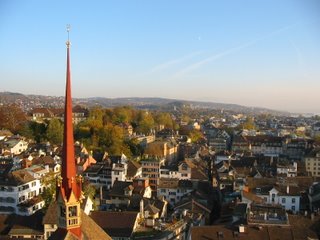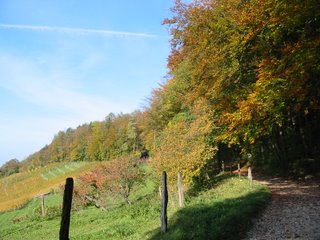
I discovered Zermatt with the first person to ever stop a Swiss train dead in its tracks. Waving her hiking stick in front of the approaching train, Felicity yelled, “please stop, my husband is sick.”
Her husband John had fallen while attempting to hike down from the Gornergrat. Only about 15 minutes into the hike when he fell, I didn’t have too much sympathy for him since he had taken his spill while smoking a cigar. It’s hard enough just to breathe normally while hiking in places with altitudes above 10,000 feet without dealing with smoke inhalation along the rocky, steep, unsteady terrain.
John had gotten up and was waddling along, having left his cigar in the dust, but Felicity would have no more slow-poke hiking despite the now clean mountain air.
The train came to a halt. I was impressed. The Swiss are known for their promptness and nothing can usually get in the way of a timely arrival. People running for trains and buses are never waited for and are always left behind to ponder their tardiness.
The conductor yelled in perfect English, “I will stop on the way down.” Thus, we had about twenty more minutes to admire our surroundings. The sky was perfectly blue and the Matterhorn, surrounded by tourists masquerading as a strange kind of paparazzi, displayed its quiet, unaffected beauty before us.
Its grandeur made it look fake, almost as unbelievable as the Swiss train that had been allowed to be delayed by a minute due to Felicity’s waving hiking pole.
Hikers passed us, mainly in silence—not out of unfriendliness, but rather out of not knowing what language to speak to us. In my four days in Zermatt, I heard English, Japanese, French, Italian, and at least six dialects of German.
The sheep weren’t as shy. Their cries could be heard directly below us. Chomping happily on the mountain grasses, their coats were thick and long, some of the shaggiest I had ever seen.
The silence of the hikers was also made up for by the crickets, who, lower down the mountain, almost sounded like a symphony being played by a relenting alarm clock, steady, monophonic, and rhythmic.
A few hundred feet above us, Benny, a St. Bernard, (St. Bernards are famous for being bred in the region), was having his 1,000th photo taken of himself and an overly excited tourist. And it was only 10 in the morning. Like the Matterhorn, he seemed unaffected by the endless flashes of cameras. Calmly crossing his legs, he awaited the next set of admirers who are promptly handed a Swiss flag for their photo opt and proudly told to chant, “Matterhorn” on command.
While Zermatt is filled with travelers from around the world, many Swiss aren’t so keen on it. Frau Armat, a native of Baden, Switzerland claims the people there are rude and thus takes her holidays elsewhere.
The Swiss believe that their hometown is superior to any other Swiss town, and thus they have difficulty finding joy in a place other than the one in which they live. For such a small country, it is amazingly territorial. Whereas Americans move from state to state without difficulty, the Swiss require much documentation just to move within the country. Thus, most Swiss don’t wander far from their birth, and besides, they believe that it is the best place anyhow.
The train approaches and Felicity waves her hiking pole, in case, heaven forbid, the conductor had forgotten his promise. We hop on, our own private stop. The tourists are only too happy for the train to stop, as their photos being taken from the window will now not be blurred. But the few native Swiss that are on the train give us disapproving looks as now they will now be delayed a precious minute on their journey.
In a short 35 minutes we are back in Zermatt, constantly reminded that although the town is pedestrian only, we could still be run over by a silent electric cart. Whizzing around the town, these golf cart-like vehicles haul luggage and weary tourists around the town. As no cars are allowed in Zermatt, these carts are the only form of transportation besides the train, cable car, and funicular.
In the afternoon, we escape the whizzing carts and take the funicular and cable car up to Rothorn, a refreshing change from the Gornergrat. Up here, there are fewer people. There’s no Benny or rush of tourists running in front of our cameras just in time for us to remember the back of their head forever.
If it weren’t for the restaurant at Rothorn, it would almost be commercial free up here; and the Matterhorn from this angle, has its best face forward. Further down Rothorn at Sunnegga, where the funicular stops, is a lake. One of the sunniest spots on the mountain, it seems to be where the locals come. Children play here, some row a small raft, others ride a rocking horse. Mothers set out picnics. We are surrounded by snow-topped peaks, but it is pleasantly warm, an interesting juxtaposition.
In the morning, the lake at Sunnegga reflects the Matterhorn and its surrounding peaks. The morning is the best time to enjoy it as the locals sleep in and the tourists spend yet another morning at the Gornergrat or Klein Matterhorn.
Klein Matterhorn seems to always be crowded, if not by skiers (it’s the only place open to ski on in the summer), then by tourists smiling next to the highest sightseeing point in Europe sign. At 3,883 meters above sea level, it’s even harder to breath up here than at the Gornergrat. The ice castle beckons and we walk through a long tunnel of ice to be rewarded with ice sculptures and a wine tasting.
Out of breath from climbing out of the ice castle, we take the cable car back down to Trockener Steg and have hot cocco and admire the Matterhorn yet again.
If one thing is certain, it’s that no matter how many times one has seen its peaks, it commands attention by doing nothing. The only thing is does is cause the tourist, no matter how much film or camera memory, to run out.



